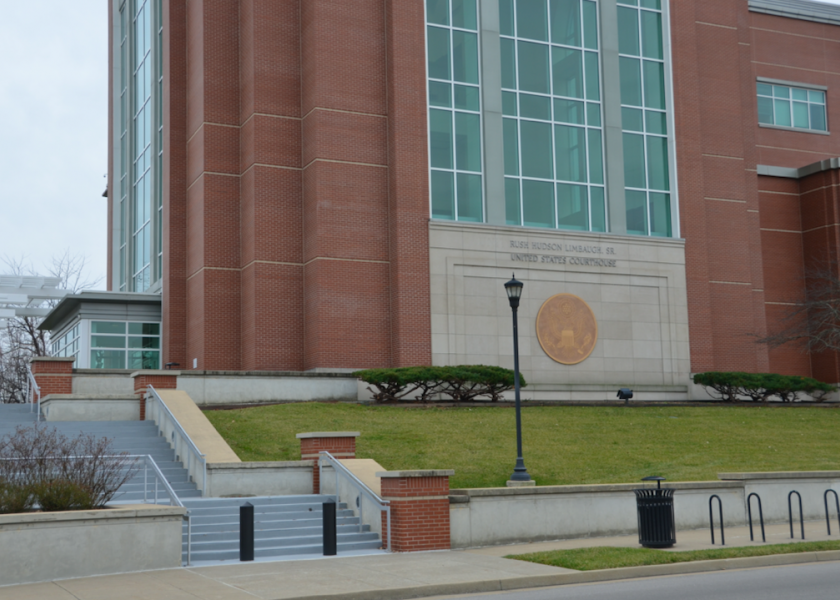$20 Million+ Dicamba Lawsuit Goes to Jury

After three weeks of argument, a seven person jury in Cape Girardeau, Mo., is deliberating whether Monsanto and BASF are responsible for damages on a peach orchard in southeast Missouri. The plaintiff accuses the companies of selling a defective product and conspiring over the launch of dicamba-resistant seeds prior to EPA approval of new dicamba formulations.
The companies say the peach losses were sparked by longstanding disease issues in the orchard.
Bader Farms, the plaintiff, is suing for damages that occurred to peach trees in the 2015 and 2016 season. In 2015, Monsanto (now Bayer by acquisition) sold cottonseed with Xtend traits with warning labels on the bag discouraging dicamba application. In 2016 the company launched the soybean product before the accompanying herbicide received approval. Xtendimax (Bayer) and Engenia (BASF), two new dicamba formulations, received regulatory approval in time to be used in the 2017 growing season.
This trial, Bader Farms versus Monsanto and BASF, is a Bellwether trial for a larger potential class action for dicamba damages. The trial is being held at the Eastern District of Missouri Southeastern District Division.
Plaintiff claims
Over the course of more than 10 days in court, attorneys for Bader Farms interviewed witnesses, played video depositions attempting to assign blame for peach orchard damage to wayward dicamba. In its civil lawsuit, Bader farms is asking for nearly $21 million in damages from Monsanto and BASF.
Bader Farms says Monsanto and BASF have a product that might kill weeds but can’t be controlled and the off-target movement of that product led to tree death. Furthermore, they say the companies conspired together in 2015 and 2016 when the cotton and soybean seed products were released prior to herbicide approvals, sparking a chain of off-label use of older products.
“Defendant Monsanto would benefit from the sales of its defective and incomplete seed system. Defendant BASF, as the nation’s largest seller of dicamba-based herbicides, would benefit from the sale of its existing, older dicamba-based herbicides,” plaintiffs said in their complaint.
“They can’t claim they didn’t know about these products,” according to closing arguments by plaintiff’s council. The continue that because Monsanto limited university testing and released a system without the accompanying herbicide, they knew damage would happen and still moved forward with the product. “The fact is what happened [damage on widespread acres] was foreseeable.”
“This is the first product in American history that literally destroys the competition—buy this product or else,” plaintiff council Billy Randalls continued.
Plaintiff witnesses included Bill Bader, owner of Bader farms and Ford Baldwin, former University of Arkansas Extension weed scientist. Baldwin testified that he personally identified trees in Bader’s orchard with clear signs of dicamba damage.
Bader testified that he saw his peach yields drop by 40% after receiving dicamba damage to trees. The plaintiffs also claim that dicamba damage accelerated disease issues in the orchard that could have otherwise been managed. Bader claims every orchard has been affected by dicamba damage, resulting in death or yield loss.
“Defendants knew that dicamba herbicides cannot be applied safely to Xtend crops due to their extreme volatility and propensity to move off-target, which caused crippling damage to plaintiffs’ peach trees, agricultural crops, vegetation and timber throughout 2015, 2016, 2017, 2018—and ongoing,” court documents state.
Defense response
Monsanto’s experts claim that dicamba was not the cause of tree death on Bader Farms. Instead they said it was a variety of diseases that decimated the peach trees, namely armillaria root rot. Armillaria is a fungus that lives in the soil on tree roots.
“[Monsanto showed] scientific evidence of armillaria through DNA testing,” defense council Jan P. Miller said in closing arguments. They sent more than 50 root samples in for testing, at the price of $250 per test, and found armillaria present on all usable samples.
“The pattern of infection centers [how armillaria spreads in orchards] showed up 10 years before the first Xtend seed was commercialized,” Miller continued. “There’s no objective evidence dicamba was on the farm.”
BASF, which was not added to the lawsuit until 2017, interviewed some of its own staff members to present evidence refuting a conspiracy and used a peach expert to show evidence that Bader farms had a disease problem, not a dicamba issue.
On the claim they conspired with Monsanto the company said: “We are competitors,” BASF council John Mandler said in closing arguments. “BASF sold Engenia, not the system.”
The system refers to dicamba tolerant crops in conjunction with the herbicide. Plaintiffs claimed that BASF profited in increased sales from off-label dicamba products in 2015 and 2016 and received value share payments with Monsanto on each bag of seed sold.
The conspiracy claim is the plaintiff’s way of trying to hold BASF liable for the 15’ and 16’ damages, Mandler said. “They want you to find conspiracy and joint venture so Monsanto and BASF share in the losses. We should not share for something we have no control of.”
When it comes to the actual product, Engenia, BASF representatives say they did allow universities to test the product in advance of its launch and the label explicitly warns applicators about what they need to do to keep the product safe.
Stay tuned to Agweb.com for more information about what the outcome of this case means is and what it means for future dicamba trials regarding soybean damage, and what it means for this year’s re-registration of Xtend, FeXapan and Engenia herbicides.







